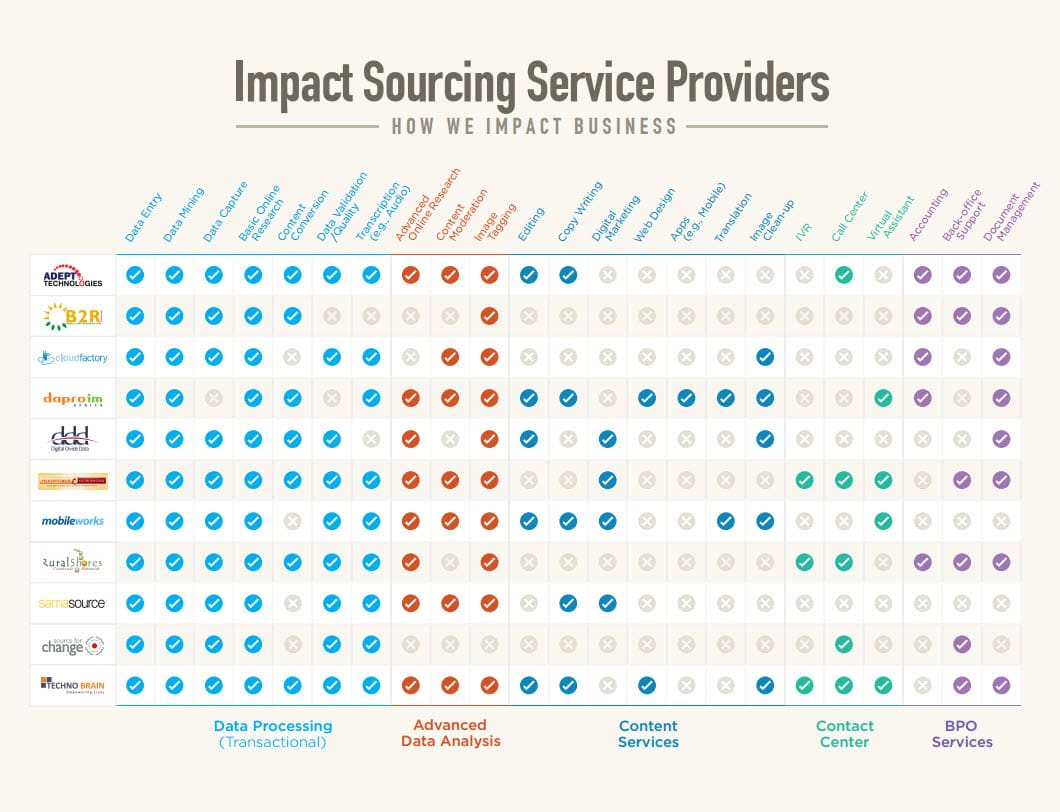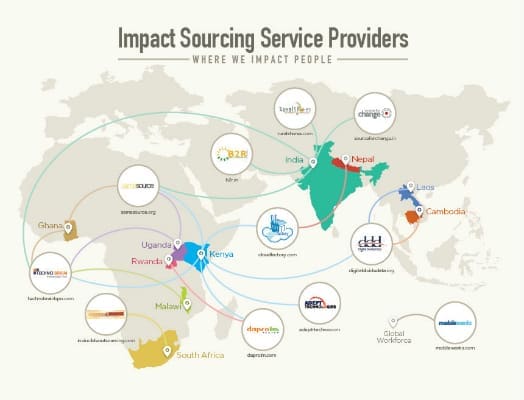With increased focus on shared value, inclusive business, and corporate social responsibility, businesses are looking for both financial return and social impact in their own practices, and in those of their supply chain. At the Outsourcing World Summit, hosted by the International Association of Outsourcing Professionals (IAOP), impact sourcing—one way for companies to achieve both goals—was a main session topic.
Putting the impact sourcing value proposition to the test, Darcy Antonellis, CEO of Vubiquity and until just recently, President of Warner Brothers Technology Group, Tim Langley-Hawthorne, Vice President IT Governance, Western Union and Gene Agee, Vice President, Sprint, asked thoughtful questions of four Impact Sourcing Service Providers, all partners and friends of the Rockefeller Foundation. These service providers were Samasource, Digital Divide Data, Cloud Factory and Rural Shores.
In answering these outsourcing buyers’ questions on the business model, the social impact, and the ability to scale quickly, the panelists highlighted why Impact Sourcing is the next innovation in outsourcing:
Samasource
Leila Janah of Samasource explained how her business uses state-of-the-art technology to send work from companies like Google, Microsoft, and LinkedIn to workers across the globe. The quality these companies receive back is so high that 90 percent of them are retained as Samasource clients. David, one of the 1,000 workers employed by Samasource, is based in Uganda. Once a child soldier, David now provides U.S.-based clients services ranging from image and content tagging, to machine learning and content generation.
Cloud Factory
For Mark Sears of Cloud Factory, a vacation in Nepal led to the creation of his high-tech company. Impressed by the skills of the people in Nepal, but concerned about the lack of job opportunities, Mark started Cloud Factory as a business that impacts the local community. Using technology developed in part by acquiring a Google Ventures-backed company, Cloud Factory provides hyper-efficient services using the cloud. Caring about their employees and encouraging them to care for their community allows Cloud Factory to provide superior services to clients, in one case coming in under budget by 35 percent and exceeding the SLAs of the contract.
DDD
Lori Silverstein had a successful, fifteen-year career at BPO. But after becoming curious about why her company was losing deals to an impact sourcing service provider (ISSP) located in Cambodia, she started working for DDD. DDD provides data processing, advanced analysis, and content services to clients such as Harvard, Stanford, and Ancestry.com. Spread across Cambodia, Laos, and Kenya, their 1,000 workers also receive education subsidies, enabling them to earn an income while developing their professional skills. This four-to-five year study program also serves as a retention strategy, enabling DDD employees to provide consistent quality services for several years in an industry often beset by high attrition.
Rural Shores
Murali Vullaganti’s Rural Shores employs more than 2,000 high-potential but disadvantaged people in rural India. These people provide services like call center support in English and local languages, and accounting and back office support to Accenture and major telecoms, like Vodafone and Airtel. Rural Shores flexibility allows them to quickly scale when necessary, even by 200 percent in a mere months.
These are just four organizations leading the field in impact sourcing. Take a look at the following guides to see how the ecosystem of Impact Sourcing service providers are impacting communities and their bottom line:
The Rockefeller Foundation has been supporting the development of the impact sourcing sector and encourages all IAOP members and outsourcing buyers, providers and advisors to get involved. Although we are dedicated to impact sourcing through our $100 million Digital Jobs Africa Initiative, we can’t do it alone. As Rockefeller Foundation Vice President Zia Khan notes in the video below, we can’t achieve the impact that we envision without the buy-in, participation, and expertise of the private sector.
If you’re a buyer, consider buying services from impact sourcing providers. You can also ask your existing suppliers to explore adopting impact sourcing as a permanent practice. They can recruit impact sourcing workers to provide your services. Part of The Rockefeller Foundation’s work in this space is supporting the development of tools that will help you do this, including providing metrics to include in your supplier scorecards.
Providers can start recruiting impact sourcing workers today. This will provide an immediate competitive advantage with your buyers. They’ll be happy to see you providing the same quality of service while also having a positive impact on the communities in which you work.
And finally, advisors can help customers navigate this space to help guide them in how best to engage in impact sourcing.
For more information on how to get involved, please email: ImpactSourcing@rockfound.org


Leave a comment